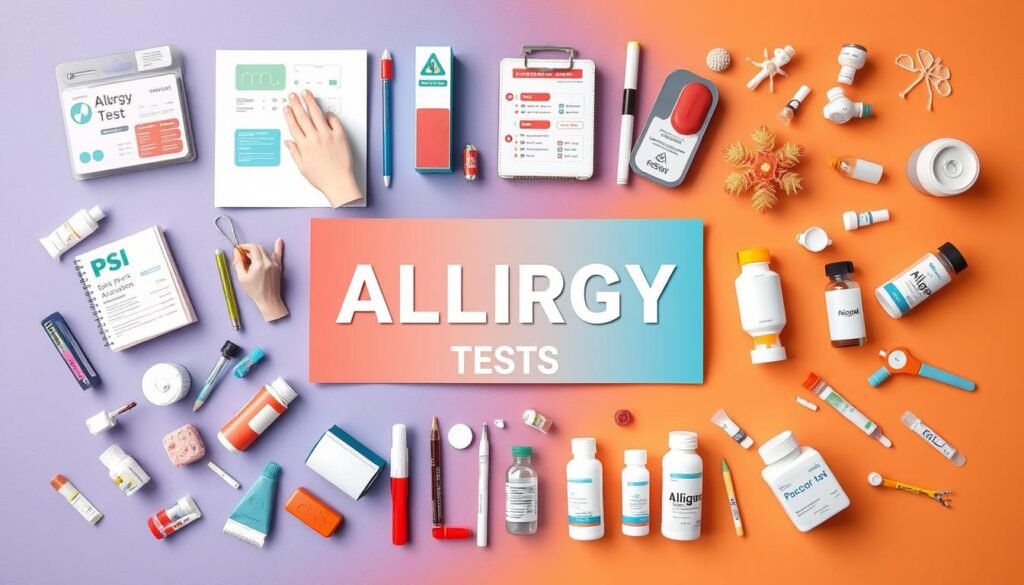Allergies impact over 50 million people every year in the U.S. They are a leading cause of chronic illness. This complete guide dives deep into allergy testing options and treatment options for allergies. It helps people manage their health better.
Getting the right diagnosis and a personalized treatment plan is key. This article will cover symptoms that hint at allergies and how to diagnose them correctly. Thanks to modern testing and treatments, people can find their specific triggers. They can also learn how to lessen their symptoms and live better.
Learning about treatments like antihistamines, immunotherapy, or changing your lifestyle is crucial. A good understanding of treatment options for allergies leads to smarter decisions. For more on how stress affects health, read the adrenal fatigue guide. It also shows why taking care of your overall health matters.
Key Takeaways
- Allergies affect over 50 million people annually in the U.S.
- Accurate allergy testing is essential for effective treatment.
- Various treatment options exist, from antihistamines to immunotherapy.
- Understanding personal triggers can significantly reduce allergy symptoms.
- Consulting a healthcare provider for personalized plans enhances management.
Understanding Allergies and Their Impact
Allergies need to be understood to improve life quality. They happen when the body mistakes safe things for dangers. Things like pollen, pet dander, mold, and certain foods can cause allergies. In the U.S., around 50 million people are affected by them.
Allergies can heavily affect daily life. They can lower work performance and harm overall health. Symptoms might be mild like sneezing, or severe, leading to anaphylaxis. This is a danger when facing allergens such as some foods or insect stings.
Knowing common allergens is key for those at risk. The top allergens are:
- Pollen from trees, grasses, and weeds
- Mold spores
- Pet dander
- Dust mites
- Cockroach waste
- Mice droppings
Dust mites are major asthma triggers, causing itchy eyes and runny noses. Allergies to insect stings can range from mild to severe. Knowing about different allergic reactions aids in safer environment navigation.
To manage allergies well, you must identify and avoid allergens. Knowing about triggers and symptoms allows people to lessen their exposure. This improves life quality.
| Common Allergens | Potential Symptoms |
|---|---|
| Pollen | Hay fever, sneezing, itchy eyes |
| Dust Mites | Itchy eyes, respiratory troubles |
| Pet Dander | Asthma signs, skin rashes |
| Mold | Coughing, sneezing, itchy skin |
| Food Allergens | Nausea, hives, anaphylactic shock |
Getting to know allergies and their effects is crucial. It helps make daily life safer and more comfortable for those affected.
Common Symptoms of Allergies
Allergies show up in different ways for different people. Some may sneeze, have a stuffy nose, or get rashes. Often, allergies come and go with the seasons. For instance, hay fever hits hard in spring and fall.
Knowing how to spot an allergic reaction is key to managing it. Pollen can make your nose run and eyes itch. Pet dander might make it hard to breathe or cause wheezing. Mold can lead to dry skin or rashes.
There’s a big list of what can trigger allergies. Foods can cause strong reactions, like hives or trouble breathing. Some even get a tingling feeling in their mouth. Spotting these signs early helps in finding out what you’re allergic to and getting help fast.
Serious cases like anaphylaxis need quick action. If you see signs of a bad allergy, getting the right help is crucial. Consulting professional advice ensures you get the care tailored to your allergy.
Allergy Diagnostics: Importance of Accurate Testing
Getting the right allergy diagnosis is key for effective treatment. First, doctors start with a deep look into your medical history. They check your past health, any allergies in your family, and your symptoms. This helps find out what might be causing your allergies.
Steps for Initial Allergy Assessment
Here’s what the first allergy check involves:
- Symptom Tracking: You’ll need to note down your symptoms and what triggers them in a diary.
- Physical Examination: Doctors do a full check-up to spot allergic reaction signs.
- Allergy Testing: Tests like skin prick and IgE assays help figure out the allergens.
Detailed Medical History Review
A detailed look at your medical history is crucial. It helps doctors understand your and your family’s health better. This step can lead to finding out what allergens affect you more accurately. Things covered include:
- Previous Allergic Reactions: Any allergies or bad reactions to things like food, drugs, or the environment you’ve had before.
- Family History: If allergies run in your family, it might mean you’re more likely to have them, too.
- Environmental Exposures: Looking at where you live or work to see if that’s causing your symptoms.
Options for Allergy Testing and Targeted Treatments
It’s vital to know about different ways to test for allergies. There are many methods out there, each showing us unique things about allergic reactions. Both skin and blood tests are useful. They help doctors create customized plans for managing allergies.
Skin Tests: Prick, Intradermal, and Patch Testing
Skin tests stand out in allergy testing. They involve putting small allergen amounts on the skin to quickly see reactions. The main skin tests are:
- Prick tests: They put a diluted allergen on your skin and make a small prick to let the allergen in.
- Intradermal tests: A little bit of allergen goes under the skin, especially when prick tests don’t give clear results.
- Patch tests: Mainly for contact dermatitis, they place allergens on your skin for a long time to check for late reactions.
Blood Tests: Specific IgE Testing
Blood tests, like the specific IgE test, are another option. They measure allergen-specific IgE antibodies in your blood. This method lays out a complete picture of what you’re sensitive to. The advantages are:
- Good for people with skin issues or who are taking certain meds that affect skin tests.
- Results can come faster than from skin tests, which is great when time matters.
- Blood can be drawn under any health condition, leading to swift and precise results.
Choosing the Right Test for You
Choosing the right allergy test means considering your unique situation and health background. Talk with an allergist about what you need. They might suggest:
| Test Type | Benefits | Limitations |
|---|---|---|
| Skin Tests | Quick results, immediate reactions observed | Not the best for some skin conditions or if you’re on certain medications |
| Blood Tests | Works well for different situations, not affected by meds | Results might take longer than skin tests in some scenarios |

Food Allergy Management Strategies
Handling food allergies means learning about your diet and knowing what might trigger a reaction. It’s key to keep a food diary and do oral challenge tests. These steps make dealing with food allergies easier and safer.
Keeping a Food Diary
Writing down what you eat helps find out what causes your symptoms. You and your doctor can then figure out what you’re allergic to. It makes managing your allergies smoother, helping you choose your food wisely. Always read labels to avoid common allergens like milk and nuts. Check out food allergy management guidelines for tips on keeping a good food diary.
Oral Challenge Tests and Their Role
Oral challenge tests confirm if you’re allergic to certain foods. Doctors watch you closely as you try a bit of the suspected food. This helps you know what to avoid, so you can eat safely. Research into treatments like oral and sublingual immunotherapy is ongoing. Understanding these tests can help keep you and your family safe.
Environmental Allergen Testing
Knowing what causes allergies in your home is very important. Tests for allergens help find what inside might make you feel bad. You might find dust mites, mold, pet fur, or pollen. You can test at a doctor’s office or with a kit at home.
Identifying Triggers in Your Home
When you know what’s causing your allergies, you can make your house safer. Cleaning often, keeping the air dry, and using air cleaners can help a lot. Skin prick tests are about 85% right in pointing out what you’re allergic to. Blood tests are another good choice, being right 70–75% of the time.
Common Environmental Allergens
Many indoor allergens can make you sick. Here’s a table of common ones and how they affect you:
| Allergen | Source | Symptoms |
|---|---|---|
| Dust Mites | Bedding, upholstery, carpets | Sneezing, runny nose, itchy eyes |
| Mold Spores | Bathrooms, kitchens, damp areas | Respiratory issues, skin rashes |
| Pet Dander | Pets’ skin flakes, saliva | Itchy eyes, asthma attacks |
| Pollen | Plants, trees, grasses | Seasonal allergies, sneezing |
| Insect Stings | Bees, wasps, hornets | Anaphylaxis, local swelling |
Learning about these allergens helps improve your life. Taking action and watching your space helps manage allergies well.
Exploring Targeted Treatments for Allergies
Understanding various treatments for allergies is essential. There are both traditional medications and new therapies. These therapies change how our immune system reacts to allergens. By doing so, they help lessen symptoms and make life better.
Medications: Antihistamines and Corticosteroids
Antihistamines are a key part of treating allergies. They provide quick relief by blocking histamine in the body. This helps stop sneezing, runny nose, and itchiness. Some well-known antihistamines include Claritin, Zyrtec, and Benadryl. However, they might not help with inflammation.
That’s where corticosteroids come in. These can be nasal sprays or pills. They’re really good at reducing inflammation caused by allergies. This gives a more complete approach to treatment.
Allergen Immunotherapy and Its Benefits
Allergen immunotherapy offers long-term relief. It slowly exposes the body to allergens to build up tolerance. You can get it through shots or under-the-tongue tablets. This depends on what works best for you.
Studies show it can change how allergic diseases progress. It reduces how severe allergies are and lessens how much medicine you need. Targeted treatments like this show a move towards more personal allergy management.
| Treatment Type | Method | Duration of Treatment | Benefits |
|---|---|---|---|
| Antihistamines | Oral tablets or nasal sprays | As needed for symptom relief | Immediate symptom relief |
| Corticosteroids | Oral or nasal administration | Short- or long-term usage | Reduces inflammation and irritation |
| Allergen Immunotherapy | Injections or sublingual tablets | 3-5 years | Long-term tolerance and reduced symptoms |
Personalized Allergy Care for Every Individual
Personalized allergy care is all about making treatments fit each person’s unique needs. Allergists look at allergies, medical history, and what patients prefer. They then make a treatment plan just for them.
This approach greatly improves the chances of managing allergies well. It makes life better for those with allergies. A huge number of Allermi patients, over 90%, find this method more effective than others.
Effective options within personalized allergy care include:
- Multi-ingredient nasal sprays, proven to be more effective than single-ingredient alternatives.
- Sublingual immunotherapy protocols for moderate food and environmental allergies.
- Food allergy desensitization treatments available for various allergens.
New treatments like ultrasound-guided lymph node injections can offer lasting relief with few doctor visits. This shows how personalized care uses new methods to meet everyone’s needs.
Also, having a dietitian can help you eat right despite food allergies. This approach considers all parts of managing allergies.
Working together, healthcare providers create a treatment plan just for you. This plan is stronger and more effective because it’s made to meet your specific needs.

Emergency Treatments: Dealing with Severe Allergies
For people with severe allergies, acting fast is key to staying safe during an allergic reaction. It’s important to know the signs of a bad allergic reaction right away. Always be ready with emergency allergy treatments close by.
Importance of Carrying Epinephrine
Having epinephrine on hand is critical for those with dangerous allergies. This medicine works quickly to control anaphylactic reactions. These reactions can get very serious, very fast, leading to life-threatening situations without quick treatment. Know the symptoms like trouble breathing, swelling, or hives.
Learning how to use an epinephrine auto-injector is crucial. Patients need to practice with the injector and understand the right time to use it. This increases the chance of a successful outcome. A written emergency plan is helpful so everyone knows what to do during an emergency.
Being prepared is crucial for handling severe allergies. Keeping up with your healthcare provider about allergy management and what to do in an emergency is important. This way, you can feel confident in any situation. Carrying epinephrine is a simple but important step for safety in daily life.
Allergy Prevention Strategies
Effective allergy prevention is about cutting down allergen contact. It also includes making your home healthier. Identifying allergens and acting early can reduce allergy symptoms.
Reducing Exposure to Known Allergens
Lowering allergen exposure is key to managing allergies. You can make simple changes like:
- Using hypoallergenic bedding to cut down on dust mites.
- Cleaning carpets, curtains, and upholstery regularly to handle pet dander and dust.
- Keeping windows shut during pollen season to stop allergens from coming inside.
- Removing shoes before going indoors to keep outdoor allergens out.
Home Modifications for Allergy Relief
Making certain changes at home can help with allergies. These alterations include:
- Adding HEPA filters to your AC and heating to capture airborne allergens.
- Putting air purifiers in sleeping and living areas for cleaner air.
- Keeping humidity at the right level to stop mold from growing.
- Reducing clutter to decrease dust.

Benefits of Consulting an Allergist
Seeing an allergist brings many advantages. These experts have the right skills to spot and treat allergies well. They make customized care plans, so you get the best treatment.
Expertise in Allergy Diagnosis and Treatment
Allergists go through a lot of school and training. This teaches them everything about allergy expertise. They’re great at finding what causes your allergies.
They do tests, learn a lot, and tell you how to get better. Allergists know how to handle tough allergies. They pick the right meds for you.
- They test to find what bothers you.
- They give you strong meds, not just pills for sneezing.
- They teach you how to live better with allergies.
Access to Latest Advances in Allergy Science
Allergists know the newest allergy science. This means you get the latest treatments. Like ASI, which helps your body not react so badly to allergens.
This know-how means you can live better, thanks to smart allergy plans.
“An allergist can create personalized action plans to address severe allergic reactions, such as anaphylaxis.”
Talking to an allergist means getting better allergy care. This is true no matter your age or where you’re from.
Alternative and Complementary Approaches
Looking into alternative and complementary methods offers new ways to handle allergies. These options are great for those who prefer holistic care. Acupuncture has become popular as a method to ease allergy symptoms, by targeting special points on the body.
Acupuncture for Allergy Relief
Acupuncture helps with many health issues, including allergies. It uses fine needles at certain points to boost the body’s healing. Studies show that acupuncture can improve allergy symptoms, especially in kids. This makes it a key part of a full treatment plan.
Evaluating Natural Remedies
Natural remedies are being closely looked at for allergies. Things like herbs, supplements, and other products may help. Yet, it’s important to check how effective and safe they are for allergies. Talking to doctors about these options helps patients make the right choices. This way, they get care that fits their needs.
Preparing for Your Allergy Appointment
Getting ready for an allergy appointment is key to a successful visit. Having information for allergist ready helps focus the assessment. It’s good to note down symptoms, any meds, and family history of allergies. This helps make the visit more useful and helps create a good treatment plan.
What Information to Bring
Make sure to take these items for a better talk with your doctor:
- Detailed record of symptoms and how often they happen
- List of all medications, even those not prescribed
- Family history of allergies or similar issues
- Past allergy test results
Bringing these details helps make the check-up smoother. For more tips on preparing for your allergy visit, click here.
Questions to Ask Your Healthcare Provider
Coming with questions for healthcare provider clears doubts and helps you learn more about managing allergies. Think about asking these important questions:
- Which tests do you think are needed, and why?
- What should I expect from the test results, and when?
- What treatment options are there, and what are their side effects?
- How can I best deal with my symptoms?
Coming prepared with questions for healthcare provider makes the visit more interactive. It helps you learn and take an active role in your care. This approach is crucial for the best treatment.
Conclusion
The journey of allergy testing and treatment can seem hard, but knowing the basics is key. Accurate tests like serum and skin ones are vital before starting treatments such as monoclonal antibodies and biologics. This helps cater to everyone’s unique needs in managing their allergies.
Advancements in allergy therapy bring hope. Omalizumab and new treatments like Palforzia show a bright future for severe allergy management. It’s important to get advice from professionals. This way, people can find treatment plans that fit their health situation perfectly.
The main aim is to improve life for those with allergies. With the right steps and knowledge, improving well-being is possible. This guide ends on a positive note, showing that with support, managing allergies is achievable.